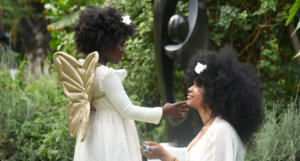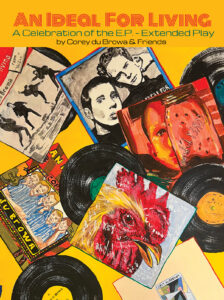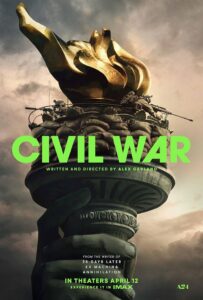
Growing up in God’s Country
The first memory I have of Third Ward Elementary School is the sound of my father shooting his rifle. I had moved to Bradford, Pennsylvania just before I began Kindergarten. I went to Third Ward one summer night for the first time with my Dad. He was a marksman and was going to target shoot at the rifle range in the basement of our school, which used to be a high school. The new high school was home of a newer, larger rifle range as well as the national championship rifle team for many years.
It was nothing for me when I was in junior high and high school to walk down the street with a rifle to a friend’s home who had a shooting range on his property. I was unusual though, in that I never took my hunter’s safety training that would allow me to get a hunting license. Much to my father’s dismay, I was not interested in killing things. It was in part his fault, as he would never let me play with guns the way other kids did. I was not allowed to point a gun at another person. I was taught to never point a gun—real or toy—at something you were not prepared to kill. By the time I was in junior high the reality of the potential damage a gun could cause was very real. Two of my classmates were injured by guns accidentally discharging: Norm Runyan was shot in the foot, Allen Riley was shot in the neck. Allen was paralyzed for life.
Living in the heart of an American gun culture then, I saw guns were treated with respect and not understood to be as much a means of protection or aggression as sporting equipment. Even when the nearby town of Olean, New York had one of the first mass shootings in my lifetime, people saw this an anomaly. Ironically the shooter was a member of Olean High’s rifle team when he opened fire on Main Street 44 years ago, December 30, 1974. One bad apple doesn’t spoil a bushel was the response. Guns were an important part of our lives. They were as respected as they were expected.
Education in a the Big City
After high school I went to the University of Pittsburgh to study engineering. While there I began volunteering in Pittsburgh’s “Hill District”—Pittsburgh’s projects—and felt a passion to do inner city youth work. I left engineering in the Fall Semester of my Sophomore year. I would leave Pitt to finish college in Chicago thinking I would study inner city youth ministry.
Near the end of my last semester at Pitt, a friend asked me to volunteer at a fun fair for special needs teens and young adults. Having a brother with special needs, I was an easy mark. My friend and I, along with another Pitt student, were tasked with accompanying two brothers who were cognitively impaired, David and Cecil Rosenthal. It was a fun day. It continued beyond that day, though, as Cecil (the older, more gregarious brother) would frequently call the three of us. It was not necessarily a welcome interruption in the closing weeks of a semester, but not altogether unwelcome either. We three decided to get together with David and Cecil before the semester ended. Our plan was to take them to a Saturday matinee in their neighborhood of Squirrel Hill. (EPB Trivia: this is the home of Jules Shear). The afternoon did not go as planned. The Disney film we were going to see had closed and Peter Seller’s Being There was playing instead. The brothers’ parents hosted us after the show and my attempts of being sensitive to their Jewish faith demonstrated more of my ignorance than my knowledge, and my friend was unable to come, and the other student and I never quite felt comfortable with each other. However awkward the afternoon went, the boys and their family were genuinely appreciative.
That was my last interaction with them, save a few last phone calls from Cecil before the semester ended. Obviously the memories continue to this day.
NPR and Sunday Morning Yoga
I was listening to the radio while doing my early morning stoutness exercises in the dark hours before I would go to the 8 o’clock service at church. It was Sunday October 28th. At 6am KRCW transitions from music to NPR Week-End Edition. This particular morning it transitioned instead to a live press conference concerning the massacre at Tree of Life synagogue in Squirrel Hill the day before. I wondered to myself in the midst of my exercises if that wasn’t the synagogue the Rosenthal brothers attended. As it is a very Jewish area, there were other options, but somehow this sounded familiar. As I listened to various officials comment on what had happened there and the on-going response to that tragedy, one official identified for the first time the 11 who were killed. In that list they named Cecil and David Rosenthal.
I was stunned. This anonymous national event somehow became personal. Those friendly, loving, caring, and faithful boys retained all those qualities as adults from what I have read. Though I had not kept up with them since I left Pitt in 1980, it pained (and pains) me to think that their last moments in this life meant experiencing the cruelty, hate, and evil that they did. They reminded me very much of my brother Donald, who like them is cognitively impaired, and like them is a greeter in his house of worship.
Target Shooting on College Night
November 8, less than two weeks after the Tree of Life shooting, I awoke to the news of a mass shooting in Thousand Oaks, California. The night before, on college night at the Borderline Bar and Grill, a shooter killed 12 people, including a county sheriff whose response may have saved many lives. It was a year after the largest mass shooting in our country’s history in Las Vegas at a bar frequented by survivors of that tragedy.
My first response was to contact Lisa and David. Lisa was a friend who teaches at Cal Lutheran in Thousand Oaks. She said no students were hurt or killed, but a beloved recent alum was one of the victims. David is a friend and former student of mine who now teaches at Pepperdine, down the road from Thousand Oaks in Malibu. He informed me that a Pepperdine student was killed. They both told me how close this felt to them, how much their schools (both religious institutions) struggled to care for their students in their time of grief, how to help make sense of this now less than uncommon occurrence. And I became aware of how hard it is for people not to be touched in some personal way by these tragic, violent acts.
Living in a Gun Country
2018 has come to its end. One of the major news stories of this year was not only the shooting at Marjory Stoneman Douglas High School in Parkland, Florida, but the surviving students response to that shooting. The gun culture I grew up with in Northwestern Pennsylvania is not the gun culture of today that is creating this tsunami of grief across our country. And this says nothing about the literally daily gun violence in cities, towns, and boroughs that do not make the national news. I may have known people who have been victims of gun violence before, but am ignorant of it. It was quite accidental that I should learn of David and Cecil’s unconscionable murders. Their deaths were nowhere near as close to me as the experience of Lisa and David and their students. But it still stings; maybe because I cannot ignore it or partition it off from me any longer.
This gives me cause to wonder, has the gun culture in my hometown changed with the times? I applaud the students from Parkland for their activism, but that is not enough. I would hope that it is people like my father who need to join—if not lead—the conversation about gun violence in this country. It needs to engage the people who safely use guns, and teach others to respect guns for the potential damage they can do—accidental and intentional. Vilifying gun owners, militarizing our schools with armed teachers, and defensively pointing the finger of responsibility away from ourselves will not prevent 2019 from being a repeat of this year, or the years before that. My father and his generation of hunters and marksmen have passed, but has their legacy been lost as well?
If you do not know a David or Cecil, you probably know a Lisa or David. They are all closer than you think. I hope we all find the courage to take this conversation on this year, before the arguments calcify further, and the body count grows. And before the latest headline comes uncomfortably close to your life, if it has not already.


